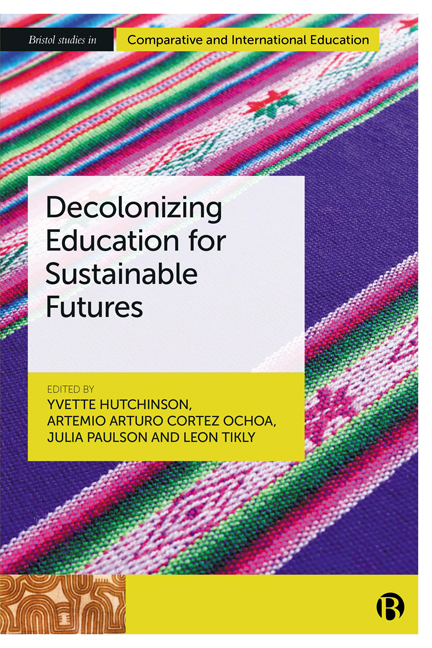Book contents
- Frontmatter
- Contents
- Series Editor Preface
- List of Figures and Table
- List of Abbreviations
- Notes on Contributors
- Acknowledgements
- Introduction
- PART I Connecting Decolonial and Sustainable Futures in Education
- PART II Decolonizing Education for Sustainable Futures: From Theory to Practice
- PART III Education’s Reparative Possibilities: Responsibilities and Reckonings for Sustainable Futures
- Conclusion
- Afterword
- Index
11 - Decolonizing Citational and Quotational Practices as Reparative Politics
Published online by Cambridge University Press: 18 January 2024
- Frontmatter
- Contents
- Series Editor Preface
- List of Figures and Table
- List of Abbreviations
- Notes on Contributors
- Acknowledgements
- Introduction
- PART I Connecting Decolonial and Sustainable Futures in Education
- PART II Decolonizing Education for Sustainable Futures: From Theory to Practice
- PART III Education’s Reparative Possibilities: Responsibilities and Reckonings for Sustainable Futures
- Conclusion
- Afterword
- Index
Summary
Introduction
This chapter revisits practices of citation-quotation in academic writing within the context of an inequitable academia, operating amid a planetary crisis. After setting out how epistemological, material and ecological reparations are intimately entangled, the chapter attempts to draw together citationalquotational practices already in evidence and which may be usefully theorized to enhance diversity in the sources and types of knowledge we can valorize. It considers how such practices can help address the epistemic-material violence of knowledge-generating systems that are still inflected with colonial and patriarchal values. By focusing on the problematic of quoting Indigenous knowledges and ways of knowing-living that involve intimate, sometimes wordless, interactions with human-plant-animal-material elements the chapter considers the usefulness of experimental, multimodal means of communicating that go beyond our conventional reliance on human language and text. By paying critical attention to the politics and ethics of both citation and quotation, the chapter highlights the role of post-human practices that may help us to recraft citational, quotational and publishing practices towards a more just world.
This chapter considers how key practices of knowledge generation in Western academic practice – citation/quotation – may be reimagined and freshly deployed. A central premise here is that the epistemological and the material are entangled and therefore citational-quotational practices can be crafted thoughtfully and inventively to invite alternative, more just and sustainable futures. The current epoch – the Anthropocene – and the debates around its naming serve as an entry point to reiterate the need for reparations that fix ongoing injustices and invite alternative futures that may serve more-than-human needs. Thus, the chapter first explores how conventional practices of citing create gendered, raced and myriad other inequalities in academia, and the sorts of reparative practices that are suggested by critical scholars. The later sections draw on moments in the works of scholars studying alongside Indigenous communities to argue for using post-human quotational practices that include human and non-human voices and interactions. This leads to considering multimodal presentations of academic work, grounded in an ethics of care, as a way of acting towards epistemic, material and ecological reparation.
- Type
- Chapter
- Information
- Decolonizing Education for Sustainable Futures , pp. 199 - 219Publisher: Bristol University PressPrint publication year: 2023

